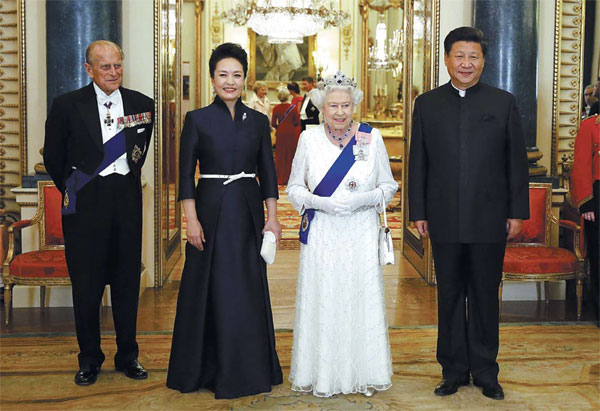Dawn of a new era
By Zhang Yunbi and Wu Jiao (China Daily Europe) Updated: 2015-10-25 13:55
|
President Xi Jinping and his wife Peng Liyuan, accompanied by Queen Elizabeth II and Prince Philip, at Buckingham Palace in London on Oct 20. Leon Neal / Reuters |
Beijing and London upgraded their comprehensive strategic partnership to a global one during President Xi Jinping's state visit to the United Kingdom from Oct 19 to Oct 23, the first by a Chinese president in a decade.
Signs of the accelerating growth in ties have been evident this year as the UK got in line early to apply for membership in the Asian Infrastructure Investment Bank in March. The two countries also maintains long-term, frequent communication in international and regional affairs.
After his reelection in May, British Prime Minister David Cameron expressed his hope of making the coming five years a "golden era" for bilateral relations.
At about 8 pm local time on Oct 19, President Xi's plane touched down at Heathrow Airport west of London. London, the first stop of his visit, was followed by a visit to Manchester.
On his arrival, Xi noted that this year "marks the start of the second decade of the comprehensive strategic partnership between the two countries".
Chinese and British national flags were seen at the Horse Guard's Parade in London days ahead, and royal hospitality greeted the Chinese leader with pomp and circumstance.
On Oct 20, Xi and his wife Peng Liyuan arrived at the Royal Pavilion on House Guard's Parade accompanied by Prince Charles and his wife Camilla.
In accordance with the highest standard of royal etiquette of the UK, there was a 103 gun-salute, 62 rounds fired from the Tower of London and 41 from Green Park.
Accompanied by Prince Philip, Xi inspected the guard of honor during a traditional ceremonial.
At noon, Xi and Peng attended the luncheon held by Queen Elizabeth II.
While addressing both houses of the British Parliament on Oct 20, Xi said the two countries have made numerous "firsts" in bilateral relations.
Given that the two countries' economic and trade relationships have undergone rapid development in recent years, Xi noted: "Britain is a leading offshore RMB trading center after Hong Kong. It is also the first Western country to issue RMB sovereign bonds and the first major Western country to apply for full membership in the Asian Infrastructure Investment Bank."
Moreover, Britain hosts more Chinese students and Confucius Institutes than any other European Union country, Xi said.
Feng Zhongping, a senior researcher on European studies and vice-president of the China Institutes of Contemporary International Relations, says there is a strong desire on both sides to push ties to new heights, which have been mirrored by the frequent high-level contacts between Beijing and London.
New opportunities for collaboration are emerging, Feng says. "When it comes to (British) exports, China's immense market and constantly growing consumption capacity of (its) consumers are very appealing to Britain." On investments, upcoming infrastructure projects planned by the British government are "desperate for the involvement of Chinese businesses", Feng says.
More than 500 people listened to Xi's 11-minute speech to Parliament, including Lord Speaker Frances D'Souza of the House of Lords, Speaker John Bercow of the House of Commons, Prime Minister David Cameron and Labour leader Jeremy Corbyn.
Xi recalled how 24 Chinese naval cadets took part in the Normandy landings during World War II and received personal thanks from Winston Churchill for their gallantry, and how China helped save a British military medic earlier this year who contracted the Ebola virus while volunteering in Sierra Leone.





